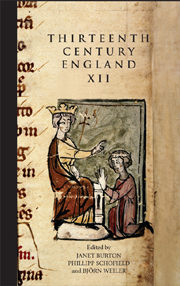Book contents
- Frontmatter
- Contents
- PREFACE
- LIST OF CONTRIBUTORS
- LIST OF ABBREVIATIONS
- The English and the Welsh in Fouke le Fitz Waryn
- Royal Piety in Thirteenth-century Scotland: The Religion and Religiosity of Alexander II (1214–49) and Alexander III (1249–86)
- The 1213 Pipe Roll and Exchequer Authority at the End of John's Reign
- The Public Debate during the Baronial Rebellion
- Richard of Cornwall and the Baronial Opposition in 1263
- Les liens personnels entre les cours de France et d'Angleterre sous le règne de Philippe III, 1270–85
- The Lay Opposition to Edward I in 1297: Its Composition and Character
- Peacekeepers and Lawbreakers in London, 1276–1321
- ‘The peace less kept’? The Origins, Revelations and Impact of Edward I's ‘Trailbaston’ Commissions of 1305–7
- Notes and Documents
The 1213 Pipe Roll and Exchequer Authority at the End of John's Reign
Published online by Cambridge University Press: 12 September 2012
- Frontmatter
- Contents
- PREFACE
- LIST OF CONTRIBUTORS
- LIST OF ABBREVIATIONS
- The English and the Welsh in Fouke le Fitz Waryn
- Royal Piety in Thirteenth-century Scotland: The Religion and Religiosity of Alexander II (1214–49) and Alexander III (1249–86)
- The 1213 Pipe Roll and Exchequer Authority at the End of John's Reign
- The Public Debate during the Baronial Rebellion
- Richard of Cornwall and the Baronial Opposition in 1263
- Les liens personnels entre les cours de France et d'Angleterre sous le règne de Philippe III, 1270–85
- The Lay Opposition to Edward I in 1297: Its Composition and Character
- Peacekeepers and Lawbreakers in London, 1276–1321
- ‘The peace less kept’? The Origins, Revelations and Impact of Edward I's ‘Trailbaston’ Commissions of 1305–7
- Notes and Documents
Summary
If ever there was a pipe roll you did not want to lose, among the strongest candidates would be the one covering the 1213 financial year, which ran from Michaelmas 1212 and concluded twelve months later. So, rather obligingly, at some point over the last eight centuries, this is exactly what a long-forgotten clerk of the Exchequer did. At least we can be sure that the Public Record Office or The National Archives did not accidentally dispose of it. No pipe roll, or indeed corresponding chancellor's roll, has ever appeared in a modern listing for either series, suggesting that the document was lost or destroyed several centuries ago, if not even earlier. Quite why this should be so will doubtless remain a mystery; certainly, it is highly unlikely that the 1213 pipe roll will suddenly emerge into the light of day, though the possibility remains – however remote – that it forms a forgotten part of a private collection or some stray remnant serves as a binding for a book, as was the fate of the 1214 chancellor's roll, scraps of which were discovered serving as the wrapping for a text on early modern medicinal treatments by a private collector, who then rather obligingly showed it to the editor during their work on that year's pipe roll. We simply do not know the fate of the 1213 roll.
Of course, 1213 is not the only pipe roll to have disappeared from the annals of history. We have only one example prior to the reign of Henry II, the stray for 1129–30, and the 1195–6 pipe roll has not survived, though fortunately the chancellor’s roll exists; but the next gap in the sequence does not come until the 1643–4 financial year, over four centuries later when the work of the Exchequer was, perhaps understandably, eclipsed by the Civil War. Apart from these few instances, from 1155 until the pipe rolls were decommissioned in 1831–2, there is a surviving document for every year. Of course, the loss of a key source is always frustrating, but given the care with which the Exchequer preserved its archives – even when pipe rolls had long ceased to be of any real practical use – the loss of 1213 becomes even harder to bear.
- Type
- Chapter
- Information
- Thirteenth Century England XIIProceedings of the Gregynog Conference, 2007, pp. 31 - 44Publisher: Boydell & BrewerPrint publication year: 2009

